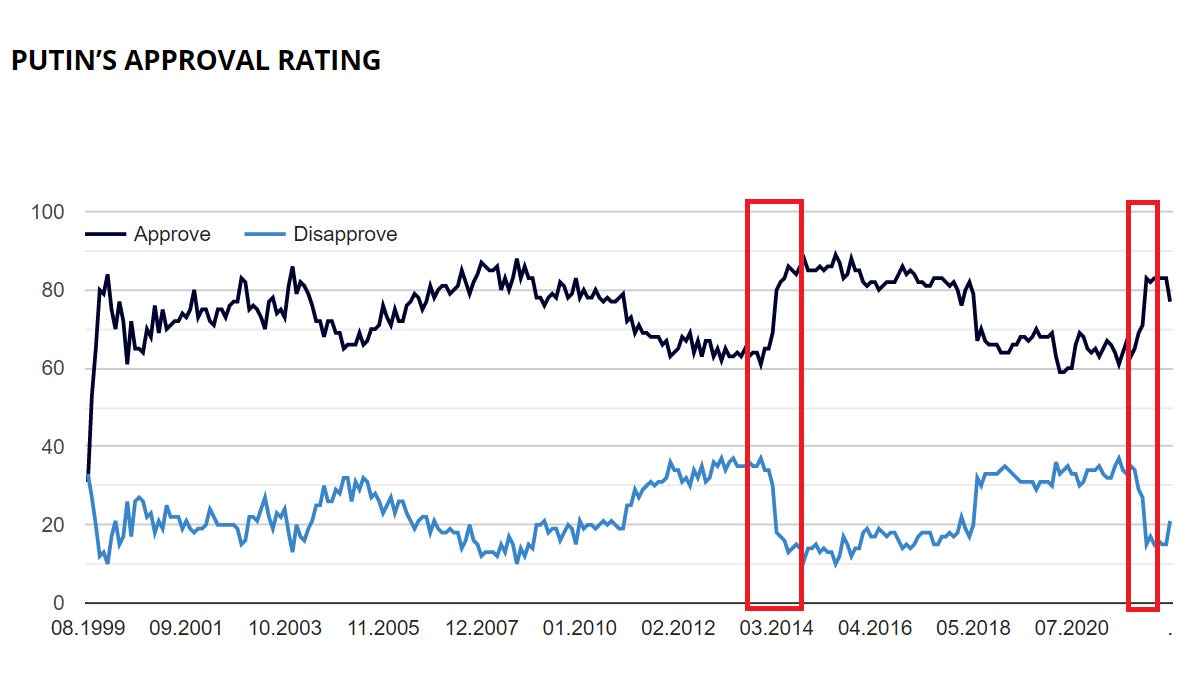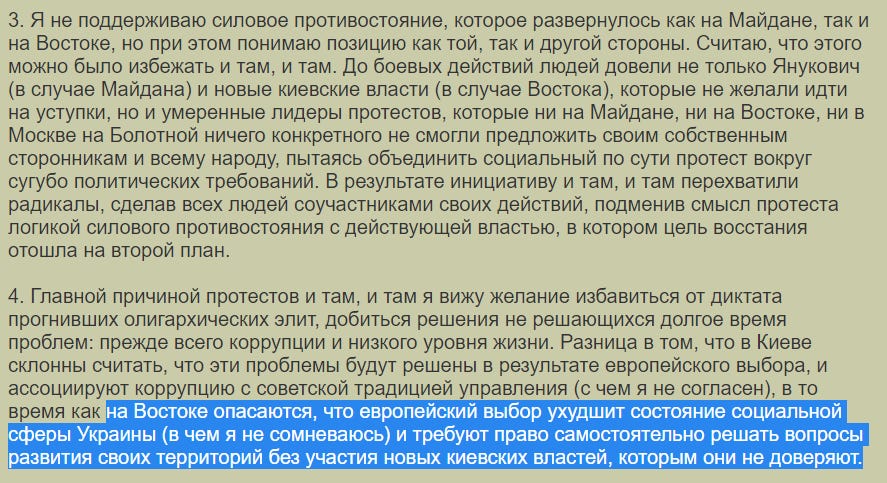Jun 11: Madi Kapparov, "There will be no 'popular uprising' in russia
Thread published Oct 2, 2022
Madi Kapparov, There will be no ‘popular uprising’ in russia
Madi worked on the thread, and has republished an edited version. EuroFile had published his original, longer thread in November 2022.
I think it’s time for our leaders (if they haven’t already) to talk about what is to come in Russia and how they are going to handle it. My fear is that we will reinstate the pre-February 2022 status quo with the Russian Federation under the illusion that Russian leaders will have learned to respect international laws and the sovereign borders of its neighbouring states. I don’t think that is possible with the current Russian leadership class (intelligence services and their adepti).
I’ll be keeping an eye on anyone who will be writing about future relations with Russia and keep you posted.
It is impossible to predict who exactly it would be, but it will be someone from the existing power structure and in all likelihood a group of siloviks (intelligence services or law enforcement, not the military).
The coup will be done under the smoke screen of a "revolution" following a "popular uprising," aka mass protests. The show would be put on for both domestic and foreign audiences to create a false sense of change in russia. A "new" russia would be open to negotiations.
Those behind the coup are also likely to use a figurehead leading the "revolution." It could be anyone popular enough domestically and abroad: @navalny, @Kasparov63, @iponomarev, or someone else. More on them later.
A figurehead would be critical to lead the masses to create enough chaos. The chaos would pull away the attention of outside observers and the resources of those who would still remain loyal to the kremlin. Once the coup is complete the loyalists are unlikely to survive.
That's why mobilization is being implemented - as long as the war continues, those who are in power and those who remain loyal continue to live.
That's why medvedchuk was exchanged - those who remain loyal enjoy protection.
Before I discuss why the russians are incapable of a truly democratic revolution it is worth pointing out that the russian military is useless by design. has multiple excellent threads explaining why so I won't delve into it.
The russians are incapable of mass protests that could lead to tangible democratic reforms or any leaderless antigovernmental protests. There are no sociological surveys on the ru protest culture, but I suspect it stems from their culture shaped by history.
Reason 1: lack of individualism.
An average russian will only try to comply with the existing order of things. If the current topic of the day is the war against "Ukrainian Nazis" all would comply, some apathetically, some wholeheartedly.
This applies even to those who flee russia. A Harvard study of soviet defector interviews confirms that the russians provided responses that they thought were expected from them. But most of them still sympathized with the soviet regime.
The russians never developed a strong sense of self. Though serfdom was abolished in 1861, it was substituted by a system marginally better, the obshchina.
Hailed as a risk-sharing system by some, the reality was that the peasant class (up to 80% of russia) was never endowed with private property rights. Stolypin's 1906 reforms did not change much. Then came collectivization. Kolkhozes, or collective farms, changed nothing.
Peasants were still tied to their collective farms with little to no incentive to invest in "their" land. Worse yet, the relatively well-off kulaks were stripped of their property by the soviet authorities, signaling to the masses that hard work does not pay off.
What about the other 20% of the old empire? Those social strata did enjoy private property rights and participated in the free-ish market economy. However, most fled with the White émigré wave after 1917, the rest were finished off by the Red Terror and the 1930s repressions.
Then came 1991. True emancipation? No. Protection rackets became common. Anyone attempting entrepreneurship had to deal with it. In the early 2000s, such protection became institutionalized by the government. Think of it as a protection tax levied by the local government.
Large successful businesses became targets for "raiding" - the federal government would fabricate a legal reason and redistribute the wealth to those who are loyal to the kremlin.
TLDR of reason 1: lack of private property rights created a culture void of individualism.
Reason 2: There is no separation between the tsar and the nation.
The tsar is the nation. It stems from an old russian imperial mantra that survived the revolutions of 1917 and lives on to this day.
"The tsar is good, the boyars are bad" is a common saying in russia when the current state of affairs is tolerable. Most existing problems are blamed on the local regional governments.
When the state of affairs is intolerable the tsar becomes bad and a new tsar is appointed and good by default. This happened during the Yeltsin-Putin switch. This faulty way of thinking about russia I observe not only in russia but also among western "experts."
This faulty way of thinking was exploited by Khrushchev in his destalinization. It existed in Brezhnev's time - despite the zastoy, era of stagnation, the soviet people lovingly joked about the premier: "He had another breast expansion surgery to make room for more medals."
Why so much love for the russian leader? I think a quote from my relative living in russia sums it up beautifully: "protesting against the authorities is to protest against the nation."
The tsar is the nation.
If the tsar pleases the masses, he is good; if not, the new one will be good.
putin is russia.
Don't believe me? Well, then, look at putin's approval ratings:
Jump 1: annexation of Crimea
Jump 2: full-scale invasion of Ukraine
Note the dip at the end (hint: mobilization)
Reason 3: A culture of low trust paralyzes the russian society.
Multiple academic studies show that generalized trust and social trust in russia are some of the lowest in the world, e.g.
Low trust has serious implications for the country's economic development; for instance, lower trust generally translates into higher transaction costs. However, more importantly, it makes all decisive collective action in russia extremely unlikely.
First, low generalized trust creates disbelief in the good intentions of a fellow protestor: "they are out there to provoke me into an illegal action for the authorities to later use against me." I heard numerous anecdotes from russians believing protests achieve nothing.
Second, low institutional trust shapes a conviction that the government would not listen to the protesting masses, prosecute and disproportionately punish those engaged in the protests.
The reality is that the protesting russians got away with a fine (not incarceration).
That was the case pre-general mobilization. The repressive apparatus is now working overtime. It is too late to be "good." It was late after Feb 23.
Unless a few hundred thousand muscovites find it in them (they won't) nothing is going to change until the political climate within russia becomes unstable enough for political opportunists to take action.
Finally, low trust translates into disbelief in the good intentions of any potential leaders of the protests. This disbelief is mediated/negated by the hypothetical leader's reputation. A political figure with little political capital is unlikely to rally large numbers.
However, with a low-trust society and an oppressive government, the russian population is left with few options for belonging. The russian empire and the soviet union implemented policies of russification throughout the empire.
Russification was impossible to implement without idealization of the oppressive colonial regime through historic revisionism and romanticization of the russian culture. After the fall of the original empire, the USSR picked up the torch and industrialized russification.
Collapse of the USSR led to no educational reforms that acknowledged past transgressions of the russian nation. Quite the opposite happened: the russians did their best to preserve imperial continuity with the russian federation becoming the only successor state to the USSR.
The belief that ethnic russians were a "force for good spreading a civilized way of life to their colonial subjects" and always on the defense in all wars lived on through the ages. The russians resort to believing in ethnic russian exceptionalism. They need to belong.
That's why contemporary russian propaganda appeals to the russian masses: messages elevating russia's greatness resonate with their deeply engrained cultural beliefs of their exceptionalism.
The belief in russian exceptionalism allows for conflicting ideas to co-exist in russia: corruption is pervasive, especially in the military, everyone knows it, and yet, everyone believes (or at least used to) that russia has the second-best army in the world.
And now that the russians are failing in their conquest of Ukraine they need to find excuses that would lineup with their russian exceptionalism worldviews, e.g. "we are fighting NATO, not Ukraine," "we have a bad general," etc.
Moreover, to protest now against the war would be to acknowledge that russia as a nation is at fault. That's why russia's "liberal" opposition incessantly labels the war against Ukraine as "putin's war" and the russian army as "putin's army."
The russians are culturally incapable of acknowledging that the war is russia's national transgression and that the russian army is committing war crimes. Ethnic russian exceptionalism coded in their culture simply does not allow them to do so. So, there will be no protests.
Of course, there are exceptions to the generalizations that I am making but they are too few to matter.
To sum up: the lack of individualism, absence of dichotomy between the authorities and the nation, low trust in the russian society, and the belief in russian ethnic exceptionalism all factor into either apathy or, worse, zealous ethnofascism in the russian population.
As the russian economy continues to degrade and russian casualties keep mounting, civil discontent will escalate. Those who are loyal to the kremlin now may not remain loyal forever. The desire to take the throne and open the country to negotiations is too much to resist.
Thus, a sufficient level of civil discontent is likely to be exploited by opportunists in a coup attempt. To rally the masses for a protest smokescreen a figurehead is required. Who could it be?
Navalny? Probably the most likely candidate as of now. He is in-country, has enough clout. The West adores him, for reasons mysterious to me. Let me be clear here, navalny is a typical russian ethnofascist. I wrote a massive thread about him:
Kasparov? He has enough clout among the intelligentsia but not among the masses. The West likes him. He's been an outspoken critic of putin for years. However, he is a populist and offers no real solutions. Moreover, he was a member of the Central Committee of Komsomol.
Ponomarev? He is currently in Ukraine. He fled there after he allegedly refused to vote in favor of Crimea's annexation as a member of the State Duma. He was part of the current russian regime for at least 9 years. russian ethnofascists likely view him as a traitor.
In April 2014, Ponomarev stated that the war in the Donbas was provoked by the new authorities in Kyiv. We know that's not true. Did he know it then?
The rest (e.g. Khodorkovsky, Yashin, etc.) do not have sufficient clout to move the russian masses. Kara-Murza is also an unlikely candidate: russian exceptionalism would not be receptive to a leader with an obviously non-russian last name.
To conclude, it is important to understand that after the coup is done, russia would not become "new" or "better." They would take a break, recover economically, and restart their colonial war cycle.
There a way to stop it? Yes, there is and it will be discussed in the next thread.
This a shorter version of an old thread from October 2022 and is still relevant.













I am not sure if I share this culturalist take on why the Russians won't protest. In the 1980s and early 1990s they seemed very capable of protesting. They also staged revolutions in 1905 and 1917.
I think that Putin has consolidated power very effectively through his network of secret services and oligarchs. And he benefitted from the fact that the Yeltsin era was a period of turmoil, so many Russians see democracy as messy and chaotic.
There are also ultranationalist, religious extremist and militarist elements that provide support for Putin.
Even in democratic countries we see the rise of authoritarianism. If we can't keep what we have, it's hard to blame pro democracy Russians for not being able to organise a revolution in such a tightly controlled and corrupt authoritarian system.